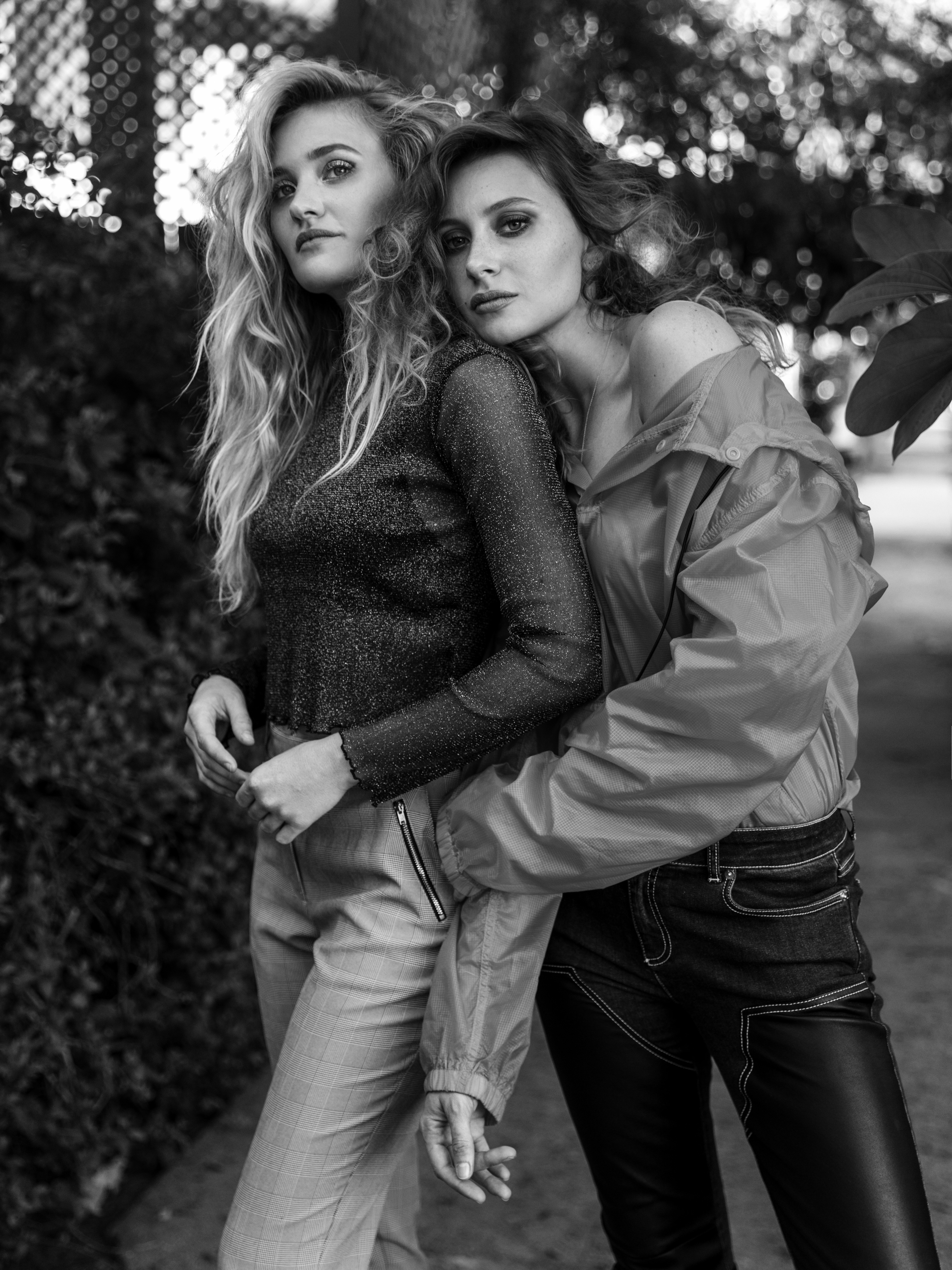It’s not on the charts, but Aly & AJ released one of the best pop singles of 2017. It’s called “Take Me”: a rush of glittery, ‘80s-inspired synth pop with a breathless chorus and a curious, irregular beat that’s finger-snap soft until it’s stadium huge. The first listen is confusing; by the fifteenth, it’s practically perfect.
“Take Me” is the lead track on the sisters’ new Ten Years EP, an independent release out today. Right from the single artwork—a lightly risqué butt photo tinted millennial pink—it’s clear these aren’t quite the same Aly & AJ you may remember. In the mid-aughts, Alyson and Amanda Joy Michalka were squeaky-clean teen superstars, releasing Into the Rush, their debut album of adolescent empower-pop, on Disney’s Hollywood Records in 2005. Two years later, the lead single from their second album, “Potential Breakup Song,” became a bonafide chart hit at No. 17. When MTV made a fictional movie based on My Super Sweet 16, Aly & AJ were the marquee names. Aly, 28, now plays Peyton on the CW show iZombie; AJ, 26, spent the past several years as a high school student on the ABC sitcom The Goldbergs.
Ten Years represents Aly & AJ’s first new music under their original names in exactly that long, after an earlier reboot as “78violet” didn’t make it past launch. Acting did get in the way, but all the while, the Michalkas maintain, they were musicians first. “It was just a matter of when are we ready, who are the people that are gonna help line this up, who’s the team, what’s the sound,” AJ says. “If we knew we could accomplish that, then we knew we were comfortable with putting out new music. But if we weren’t comfortable with the songs we were writing and we weren’t happy with where they were going, then we were gonna keep it kind of a secret.”
Behind “Take Me” are three more samples of the new sound: dreamy, pacific “I Know”; icy, nocturnal “Promises”; and “The Distance,” a classic Aly & AJ “it was love but it didn’t work out” story updated with cool-again Phil Collins drums. The themes are more grown up, the inflections more nuanced, the power chords nowhere to be heard. Spin reached the singers-turned-actresses-turned-singers by phone last week to talk about plans for a full-length album and why yeah, they would like to be cool now. This interview has been edited for length and clarity.
Spin: This EP is just four songs, but I imagine you have more.
AJ: Yes. We’re really excited. We’re continuing to write and record and we’re hoping to release a full record next year. For Aly and I, it’s been one of those things where it’s been such a long time that to start introducing our new sound with an entire record is a little overwhelming. I know as a fan of music and people who have taken a long break and come back, I’m a bit overwhelmed when there’s a full record out. Hopefully this will be kind of a great little taster and introduction to the new sound.
How did you decide on your collaborators and co-producers for this EP? Will you keep working with them for the album?
Aly: We definitely plan on collaborating with the same people that we’ve worked with for this EP. When it came to choosing collaborators, it was really us coming to Mike Elizondo, who’s been like a longtime mentor of ours from past projects we worked on that never ended up coming out. We really came to him and just said, “We kinda need some guidance, we need some help. We’re not feeling incredibly inspired right now and we would love to co-write with someone, is there anybody that you could connect us to?” He ended up introducing us to Ryan Spraker and Jamie Sierota. We’ve co-written all the songs with them and then they produced it, and Mike Elizondo oversaw the executive producing of the EP.
“Take Me” is a really rhythmically unusual song. Can you tell me a little bit about how it came together?
AJ: We had just kind of started the new pile of music and that was one of the first ones out of the gate, which is cool because it immediately guided what the rest of the songs would sound like. I think we just locked into something that we were like, “This is working.”
Aly: When it came to the structure of the chords, we were actually kind of hesitant about not having that many lyrics in it, ’cause we’re so used to writing like an A, B, C, A, B, C type of formula to songs. Ryan, one of the producers and writers, was like, “Just trust me on this.” That was kind of a leap of faith on our part just to trust in what his vision was, even though we were disagreeing with it at the moment. I remember being really against the “When you gonna take me out?” yelling part. I was like, “Naw, we’re not doing that.”
You’ve said you want to tour next year. Have you thought about what that set list looks like?
Aly: I think that it would probably be like, “Here’s two or three songs from the past, just a little moment to enjoy that, and then really, let’s get on to the music we’re making now.” Because honestly, it was 10 years ago we put out the latest music, and before that it was 12 years. It’s gonna be hard for us to play old music because it doesn’t fit with what we now would write. But I think we definitely would play something from the past, just because I know how it feels going to concerts and wanting the artist to play something off their first record or their second record.
What have each of you been listening to lately?
AJ: I’m listening to the new LCD Soundsystem record, the new Robert Plant, the new Ariel Pink.
Aly: War on Drugs.
AJ: War on Drugs.
Aly: The new National record, I love.
AJ: Yeah, that’s amazing. The new St. Vincent stuff.
Aly: Not, like, anything really mainstream pop, at least.
Those are all artists that have a certain cool cachet—the kind of things Spin covers all the time. Is that something that you’re seeking with your own project these days?
Aly: Yeah, ultimately, we would love to be in that kind of a camp. I mean, that’s obviously asking a lot and I know that we kinda have to earn our seat at the table, but that’s the goal. I mean, we do make pop music. If we’re denying ourselves that, then we’re not being realistic. But obviously we wanted to do pop music just a little bit left of center, you know?
What’s been the change in the pop industry that you’ve felt the most coming back after 10 years?
Aly: Streaming was not a thing when AJ and I released our first record at 16 and 14. It was like, music MySpace, YouTube had just been created, and physical copies were still being sold in stores. We went to Tower Records, we went to Amoeba, we went to FYE, you know, we got our CDs. I remember really trying to not buy into the iPod. I was like, heavily into just rocking my disc jockey, which is ridiculous. Streaming would be the hugest difference from when we first started releasing music to now. It’s a blessing and a curse. I think it’s great because people can listen to music easily now, it’s so accessible, but I think it’s horrible for artists because you don’t make any money off of it.
What does success look like for you at this point in your career?
AJ: I know not all musicians feel that way ’cause not everyone wants to tour, but for me, it would be selling out quite a bit of seats on a nightly basis, whether we’re headlining or opening. Consistently playing live all over the world, not just the U.S. Also, getting on radio. We were a lot younger when we first had music out, and radio wasn’t really playing acts that were under mid-20s. I feel like the acceptance now is—I kinda feel like there’s no rules. It’s like, they don’t care if you’re 16, you’re 17—if the music’s there, they’ll play it. I feel like that defines success for sure, what you’re hearing on the radio, because it’s what everyone’s getting a taste of. I don’t feel like radio’s ever really gonna die as much as some people do.
As teenagers, you were pretty vocal about being Christians, even if you weren’t necessarily making Christian music. Is faith still a part of who you are artistically?
Aly: Yeah. I mean, definitely. It doesn’t mean though that we’re gonna write music necessarily about it, like you were saying, but it’s definitely a huge part of our life and something that we’ve kind of always had as a basis. I think also just having each other, more than anything, has really been the reason why we’ve managed to stay levelheaded and secure in who we are. I can only imagine being a solo artist, having to go through the bullshit that you have to deal with at a young age. Thankfully we had each other. And obviously our faith had something to do with that as well.
Do you feel like it’s important that your music has some sort of ultimate positivity or uplift?
Aly: I think in these times, AJ and I do feel that it needs to have some kind of a message. When you go to a movie, you don’t always need to see a film that teaches you a lesson, but if it makes you feel something, I think that’s important. So if our music can make someone feel something then we’ve done our job, whether it makes you feel sad or it makes you feel hopeful or whatever it may be. But I do think that nowadays we have a responsibility as artists to send some kind of a positive message out there into the world, because I think that we’re in kinda dark times, you know, not to be a downer. I think that we need to shed light on certain subjects and on certain matters that some people aren’t talking about because they don’t have a voice to speak out about it.
AJ: Yeah, we’re not in the era as much where it’s cool to be super honest about how dark your life is and how dark other people’s lives should be. I mean, I know there was a time with like ’90s hip-hop and R&B and rap where it was like, negative content was super popular, and people loved listening to that. It was like a moment to just be angry and honest. I think now it’s like, look at people like Logic, writing about suicide prevention and depression and anxiety. That obviously really resonates, as it should.
Aly: And artists like Frank Ocean—look at how open and honest he is with his audience. There’s something really inspiring about that.
AJ: I think we’re kinda out of those times where it’s like, heavy angst. It’s more about how can we be sensitive to other people’s feelings and kind of hopefully inspire people in a positive way.





